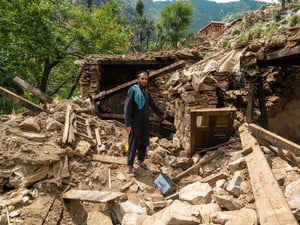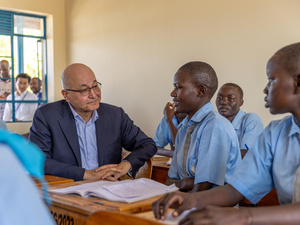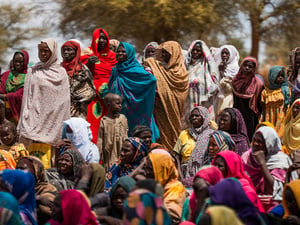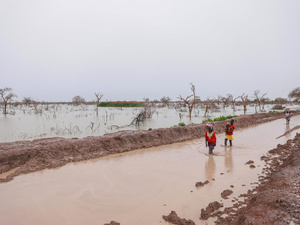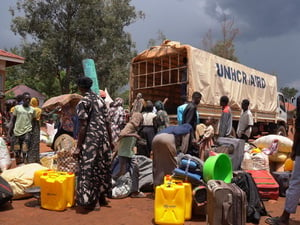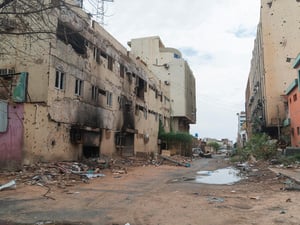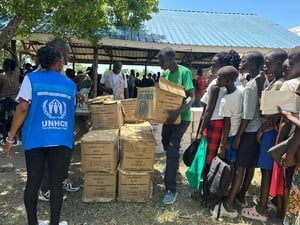Hepatitis E affects thousands, kills 111 in South Sudan refugee camps
Hepatitis E affects thousands, kills 111 in South Sudan refugee camps

An older Sudanese refugee receives medical treatment at a camp in South Sudan.
JUBA, South Sudan, February 15 (UNHCR) - The UN refugee agency on Friday said that an outbreak of hepatitis E has affected more than 6,000 people in South Sudan refugee camps since July and added that 111 of them had died.
"The largest number of cases and suspected cases is in the Yusuf Batil camp in Upper Nile state, which accounts for 3,937 cases, or almost 70 per cent of the total, and 77 deaths," said UNHCR spokesman Adrian Edwards. The camp currently holds more than 37,200 refugees.
Jamam Camp, also in Upper Nile, has recorded 1,320 cases and 25 deaths, followed by the Gendrassa Camp with 577 cases and three deaths. In Doro Camp, 58 cases have been recorded thus far, including two deaths, said Edwards, while noting that Hepatitis E was endemic in the region near the border with Sudan. The figures were compiled by UNHCR, the South Sudanese government and the World Health Organization (WHO).
Samson Paul Baba, a senior government health official, said the Hepatitis E situation was a serious concern for the authorities. "I appeal to all partners to put every effort to contain the outbreak as soon as possible," he said, after visiting the camps in Upper Nile.
Further west, in Unity State, the situation is less dramatic. 125 cases or suspected cases and four deaths have been recorded at the Yida site, which with a population of 65,540 people holds the largest concentration of refugees in South Sudan.
The majority of refugees in camps where the disease is most widespread are from Blue Nile state, an isolated rural area in Sudan where there are few established latrine facilities and uncontaminated water is not readily available. "UNHCR believes the growth in the population due to the refugee influx from Blue Nile could be one of the factors in the rapid spread of the disease," Edwards said.
While there is no treatment or WHO-approved vaccine for Hepatitis E, the risk of being infected can be dramatically reduced by washing hands with soap, especially after using the toilet, drinking clean water, using latrines and avoiding eating uncooked fruits and vegetables. Hepatitis E is a virus that damages the liver and is transmitted by consuming contaminated food or water.
Brendan Dineen, UNHCR's senior public health officer in South Sudan, said the agency was working hard on the problem. "We are not waiting this out, we are trying to deal with it quickly and efficiently," he stressed. "The plan is to focus on control measures," added Claudia Perlongo, a UNHCR water, sanitation and hygiene officer.
Emergency measures are being taken to curb the increase, with about 70 per cent of the 701 latrines under construction in Yusuf Batil completed and the remainder expected to be operating by this weekend. In the Doro Camp region, 352 latrines being built in the most affected areas around Jumjum and Ingasana villages have been completed.
Other steps being taken include additional soap distribution at Yusuf Batil comprising 168,000 bars, more than doubling the monthly rate of 250 grammes per month per person. Further soap distributions, especially for washing hands, will continue to be carried out.
Plans are under way to replace about 22,000 10-litre capacity jerrycans - which can become a source of infection if filled with contaminated water. An additional 5,000 buckets are also being shipped to Yusuf Batil and a supplemental borehole is being drilled.
Additional measures include enhanced disease surveillance, water chlorination, and an intensive health and hygiene promotion campaign in markets, schools, and at the household level.
In South Sudan, there are currently almost 113,000 Sudanese refugees in Upper Nile and some 67,000 in Unity State.
By Eduardo Cue in Juba, South Sudan


